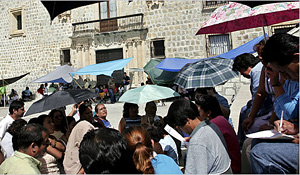 |
 |
 |
 Editorials | At Issue | June 2006 Editorials | At Issue | June 2006  
Teacher Strike May Influence Mexican Vote
 James C. Mckinley Jr. - NYTimes James C. Mckinley Jr. - NYTimes


| | Striking teachers picketed in the center of Oaxaca Wednesday and blocked highways around Oaxaca State. (Adriana Zehbrauskas/NYTimes) |
Oaxaca, Mexico — What started as a teachers' strike here five weeks ago has grown into a major movement to oust the governor of Oaxaca State that could affect the presidential election on July 2.

Last week began with strikers battling the police and ended with failed talks with a federal mediator. Tens of thousands of teachers still occupy the central square and the surrounding streets of this colonial town of 265,000, a cultural center and tourist attraction known for its artists and haunting pre-Columbian ruins.

But the teachers, who number 70,000, have been joined by dozens of community groups, Indian rights organizations, farmers' cooperatives and revolutionary parties. The teachers' initial demand for better pay has been drowned out by the general cry for Gov. Ulises Ruiz to resign.

"He has to go, Ulises, not just for what actions he has taken against us, but also for the things he has done to the people of Oaxaca, which have been nefarious," said Eduardo Reyes, a longtime high school history teacher from San Pablo Guila. "It is no longer a teachers' strike, it is a social movement."

Mr. Ruiz is a member of the Institutional Revolutionary Party, the political machine that ruled Mexico, often through fraud and corruption, for seven decades, until its presidential candidate lost in 2000. The party is still strong in Oaxaca State, where leaders of the opposition party have been killed in recent elections.

The governor's decision a week ago to use the state police to dislodge the striking teachers from the central square, resorting to the old ruling party's tactics, outraged left-wing organizations across Oaxaca, who generally disagree with Mr. Ruiz's style of governing.

Now, politicians and voters worry that the spiraling political crisis will interfere with the presidential election in unpredictable ways.

The teachers' union and its allies vow to disrupt the voting if the governor does not resign, and a fifth of the polling places are in schools. Yet the teachers are divided, with some saying they want to vote and some, including union leaders, calling for a protest vote against Mr. Ruiz's party and President Vicente Fox's National Action Party. That would benefit the leftist front-runner, Andrés Manuel López Obrador, of the Party of the Democratic Revolution, who has been challenging the former governing party's hold on the state.

With 3.3 percent of the nation's voters in Oaxaca, and Mr. López Obrador running neck-and-neck nationwide with the conservative candidate, Felipe Calderón, any shift in votes toward the leftist could be significant, political analysts said. It remains unclear how much impact the strike will have in the state's small towns, where most of the people live.

The crisis started before dawn on June 14 when 1,700 state police officers flooded the central square and started beating the teachers camped out there. The raid failed miserably, as the teachers armed themselves with sticks and stones and fought running battles with the outnumbered police and a police helicopter dumped tear gas canisters on both groups.

By the next morning the teachers had re-established themselves in the town center, and Mr. Fox, worried about the possibility of more violence, had dispatched a deputy interior secretary, Arturo Chávez, to broker peace. The federal government did not, however, send in troops or police to quell the violence.

On Friday evening, the teachers staged a march of at least 50,000 people, among them parents of students, community groups and others who supported the strike. That evening, the federal mediator negotiated the release of 9 teachers the police had arrested and the cancellation of arrest warrants for 25 others.

But on Monday, the talks broke down when Enrique Rueda Pacheco, the leader of the local teachers' union, would not drop his insistence on the governor's resignation, and federal officials said they had no control over the governor's fate.

By Tuesday morning, the cultural center of Oaxaca had become a giant protest camp. Teachers controlled access to the center of the town, with its restaurants and cathedral. Everywhere, banners, posters and graffiti called for Mr. Ruiz to step down.

The bandstand in the center of town was covered with a huge red banner reading "Popular Revolutionary Front, Building the Proletariat Power." The words "Ulysses is an assassin" were spray-painted over and over around the stone structure.

At the Benito Juárez University law school, near the central square, Mr. Rueda Pacheco convened a daylong meeting of union members and the leaders of 85 civic groups, including the José Martí Collective, the Popular Socialist Party of Mexico and the Zapata Cultural Center. Reporters were barred.

On Wednesday, union members picketed at the Oaxaca town hall and blocked highways around the state to try to keep people from entering here, the capital, while business leaders allied with the governor planned a march for the next morning to urge the teachers to return to work.

There were no police in sight during the day. Governor Ruiz suggested Wednesday that Mr. López Obrador was using the teachers' strike to ensure that the election would not go on in Oaxaca, fearing he would lose.

But the teachers and their allies were bracing for another confrontation, as rumors spread that the governor would pay people to march to the town center on Thursday. "We have to avoid confrontation and not fall into the governor's provocations," said Manuel Flores, 32, a high school teacher from San Sebastián de Yutan. | 
 | |
 |



